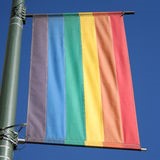Several decades ago, gay neighborhoods, sometimes called gayborhoods or gay ghettos, were very popular. Gay men and women flocked to them for the safety and camaraderie they offered. While many of these neighborhoods started as dilapidated, run down areas, the LGBT community began to transform them, and today, some of these areas are among the most affluent in their respective cities. Of course, this means property values have risen, and some gay neighborhoods are no longer really affordable by any except the upper class.
 So where do other LGBT people live? Some might expect new gay neighborhoods to start forming, and that has occurred in some areas. However, there are some cities that have a good sized LGBT population, but no real gay neighborhood. That’s because as being LGBT has become more and more accepted, fewer and fewer feel like they have to live in these communities. They feel safe living anywhere. This is especially true in the past year, thanks to the federal courts upholding the rights of same-sex spouses. With same-sex marriage legal in more than half of the states, it certainly feels to many like the fight is, if not over, at least on the downward slope.
So where do other LGBT people live? Some might expect new gay neighborhoods to start forming, and that has occurred in some areas. However, there are some cities that have a good sized LGBT population, but no real gay neighborhood. That’s because as being LGBT has become more and more accepted, fewer and fewer feel like they have to live in these communities. They feel safe living anywhere. This is especially true in the past year, thanks to the federal courts upholding the rights of same-sex spouses. With same-sex marriage legal in more than half of the states, it certainly feels to many like the fight is, if not over, at least on the downward slope.
While that’s not necessarily true, and being openly gay in some neighborhoods can be dangerous, the overall movement across the country is for gays and lesbians to live anywhere throughout a city. Comparing information from the past ten years, a little over 8 percent of gay men have moved out of areas traditionally associated with the LGBT community. More than 13 percent of lesbians have moved from these areas. The gayborhoods, it seems, are definitely on the decline. Some of this may have to do with the cost of living in these areas, but that’s not the only factor.
A number of LGBT people say they no longer feel the need to hide away in these gay communities. They’re proud of who they are, and they don’t believe they need to live surrounded by other LGBT people to be safe or happy. The gay districts are no longer as relevant as they once were, but while some see that as a good thing, some see it as a loss of culture. A number of these areas were very important in the struggle for gay rights, and older LGBT people question what will happen to them as gay neighborhoods decline.
